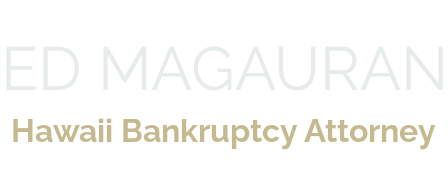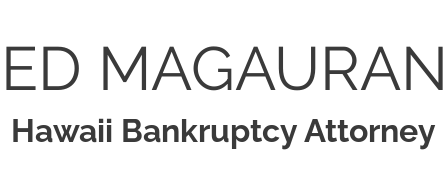HAWAII CHAPTER 13 BANKRUPTCY ATTORNEY SERVING CLIENTS THROUGHOUT THE HAWAIIAN ISLANDS
In Chapter 13 bankruptcy in Hawaii, you keep your property, but pay back a portion of your debts over a three to five-year period. Once completed you are debt free- whatever is then remaining due is discharged. This is unlike Chapter 7 bankruptcy, where most of your debts are discharged but you may have to surrender some “non-exempt” property to the bankruptcy trustee to pay your creditors. Because you repay a portion of your debts over time in Chapter 13 bankruptcy, it is also called reorganization bankruptcy.
Chapter 13 bankruptcy isn’t for everyone.
If your total debt burden is too high, you are ineligible. Your secured debts cannot exceed $1,010,650, and your unsecured debts cannot be more than $336,900. A “secured debt” is one that gives a creditor the right to take a specific item of property if you don’t repay the debt. A typical car loan is the best example of a secured debt. An “unsecured debt” doesn’t (typically) give the creditor the right to repossess property. Credit cards, personal loans, lines of credit, and medical bills are good examples of unsecured debt.
Before you can file for bankruptcy, you must first receive credit counseling from an agency approved by the United States Trustee’s office. In addition, you will have to pay the filing fee and file numerous forms. We assure you, the fee is reasonable compared to the debt you now owe. To make things easy, we handle all of the forms for you.
The most important part of your Chapter 13 paperwork will be a repayment plan. Your repayment plan will describe in detail the terms of how you intend to repay the money and the amount of your monthly payment to the Court Appointed trustee. We provide and file the plan which spells out your payments.
Your Chapter 13 plan must pay certain debts in full. These debts are called “priority debts,” because they’re considered sufficiently important to jump to the head of the bankruptcy repayment line. Priority debts include child support and alimony, and certain tax obligations.
In addition, your plan must include a provision for your your regular payments on secured debts you wish to keep, such as a car loans or mortgages, as well as repayment of any arrearages on the debts. Arrearages are the amount that you were behind on these secured debts as of the date of the filing of your case.
The plan must show that any “disposable income” you have left after making these required payments and your reasonable and necessary living expenses will go towards repaying a portion of your unsecured debts, such as credit card or medical bills. You don’t have to repay these debts in full (or at all, in some cases), you just have to show that you are putting any remaining income towards their repayment.
The length of your repayment plan depends on how much you earn and how much secured debt you owe. If your average monthly income over the six months prior to the date you filed for bankruptcy is more than the median income for your state, you’ll have to propose a five-year plan. If your income is lower than the median, you may propose a three-year plan.
Your plan will end early if you repay all of your debts in full, even if you have not yet reached the three- or five-year mark.
If for some reason you cannot finish a Chapter 13 repayment plan — for example, you lose your job six months into the plan and can’t keep up the payments — we can seek court approval to modify your plan, or seek a hardship discharge. Examples of hardship would be a job loss, divorce o or a debilitating illness.
If the bankruptcy court won’t let you modify your plan or give you a hardship discharge, you might be able to convert to a Chapter 7 bankruptcy. How a Chapter 13 Case Ends
Once you complete your repayment plan, all remaining debts that are eligible for discharge will be wiped out-discharged. Before you can receive a discharge, you must show the court that you are current on your child support and/or alimony obligations and that you have completed a budget counseling course with an agency approved by the United States Trustee.
Learn more at my Recent Articles and Videos pages.
No matter where you reside or operate a small business in the Hawaiian Islands, call or send a message to our office in Honolulu to schedule a free initial consultation. We will explain your options and help you see a brighter tomorrow.



